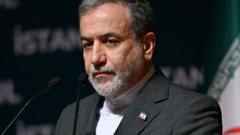Amid escalating trade tensions, recent tariffs on Chinese goods could drive up the costs of iPhones, with analysts predicting potential increases of hundreds of dollars per device.
iPhone Prices on the Verge of Increase Due to Trump’s Tariffs on China

iPhone Prices on the Verge of Increase Due to Trump’s Tariffs on China
President Trump's tariffs may lead to significant price hikes for iPhones in the US, impacting millions of consumers.
The world of consumer technology is facing an impending storm as new tariffs imposed by President Donald Trump's administration could dramatically affect prices for popular devices like iPhones. With a staggering 125% tariff now on goods imported from China, analysts are speculating how this may drive up costs for American consumers.
Apple, the tech giant synonymous with the iPhone, sources about 80% of its devices intended for the US market from China, according to recent data from Counterpoint Research. In a bid to mitigate reliance on Chinese manufacturing, Apple and its competitors are exploring production options in countries like India and Vietnam.
Recent reports indicate that Apple is actively increasing its production capabilities in India, with moves to ship over 600 tons of iPhones to the US by chartered cargo flights, especially in light of a temporary pause on tariffs affecting India.
Despite the White House's rationale that tariffs aim to promote domestic manufacturing, the complexities of the global supply chain make a swift transition difficult for any tech firm. Apple has committed to a substantial $500 billion investment in US production, yet analysts caution that transitioning a portion of their supply chain away from cheaper Asian manufacturers could be a multi-year endeavor fraught with challenges.
As the current landscape unfolds, Apple has yet to announce whether it will pass on these increased costs to consumers. However, some experts suggest that due to Apple's established market position and healthy profit margins, the company could absorb a portion of these tariff-induced increases without facing a severe impact.
Predictive analyses suggest that should the costs be transferred to consumers, prices for flagship models could soar. For instance, the price of a China-made iPhone 16 Pro Max could go from $1,199 to an estimated $1,999, according to UBS. Meanwhile, an iPhone model produced in India may see a more modest increase due to its relatively lower exposure to tariffs.
As the situation remains uncertain, many consumers are already flocking to stores in search of the latest iPhones, sparking debates about whether to opt for rival brands or hold off on upgrades. With the prospect of higher price tags looming, alternatives such as budget-friendly smartphone brands or pre-owned devices are becoming increasingly attractive.
As we inch towards autumn and the unveiling of the next generation of iPhones, the market anxiously awaits to see how these tariffs will influence the cost landscape for one of the world’s leading smartphone brands.



















